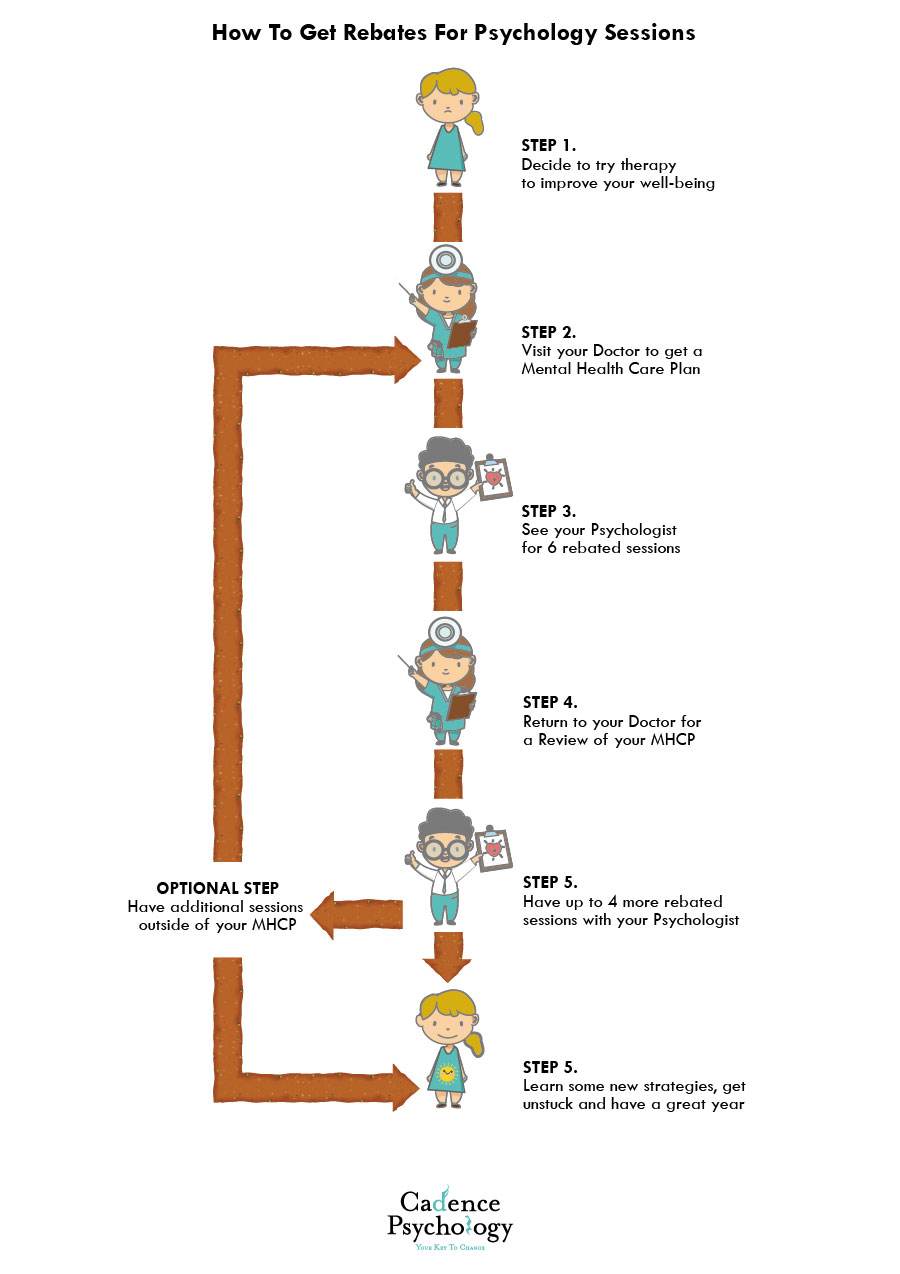Mental Health Care Plan Guide
UPDATED July 2024
Since the introduction of the Better Access to Mental Health Care scheme in 2006, Australians have been able to claim money back on their psychology sessions through Medicare for up to 10 sessions each year in the form of Mental Health Care Plans.
It’s a great initiative, but people are often a little confused as what they can actually claim back on their psychology sessions back and how they do it. Read on to learn about how claiming a rebate for your psychology sessions works through Mental Health Care Plans, Private Health Funds, and Telehealth.
We’ll even show you a few tricks if you need more than 10 psychology sessions in a year. Don’t forget to check out our guide on how to select a great Sydney Psychologist from all the options out there!4
How Much Can I Claim Back On Psychology Sessions?
Unfortunately you can’t claim 100% of the cost back. Australia might be the lucky country, but we’re not lucky!
As of 2024 you are able to claim back a rebate of $141.85 for a Clinical Psychologist or $96.65 for a Registered Psychologist for a 50+ minute session provided you have a Mental Health Care Plan. This means that unless you find a bulk billing psychologist, you’ll have to pay a gap.
The prices charged can vary a lot depending on the area of the psychologist, the qualification level, and their business model. But generally prices will vary from bulk billing to around $267 per session, which is the recommended rate of the Australian Psychological Society.
This means you’ll be looking at a gap of approximately $0 – $123 per session. To get this all started you’ll have to head to your Doctor to get a Mental Health Care Plan.96.65
What Is A Mental Health Care Plan?
A Mental Health Care Plan (or a Mental Health Treatment Plan as it’s officially called) is a brief document created by your General Practitioner (GP), Psychiatrist, or Paediatrician that reviews your current mental health.
To obtain a Mental Health Care Plan you’ll need to sit down with your Doctor and complete an assessment. During this time they’ll check in on your current coping, take a short history and may ask you to complete a questionnaire.
Once this is completed your Doctor will create your plan which makes you eligible to receive 6 rebated sessions with any registered Psychologist courtesy of Medicare. After your 6 sessions you can return to your Doctor to get a “review” of your Mental Health Care Plan which may land you another 4 sessions.
So each calendar year you’re entitled to receive up to 10 Medicare rebated sessions with a Psychologist.
Why Do I Have To See A Doctor To See a Psychologist?
There are a few different ideas on this, but the main view is that you GP is your main health professional. Ideally they know your medical and personal history so they are best placed to act as the overseer of your general health. They are also able to prescribe medication which a Psychologist can not do, so it’s generally helpful to have them in the loop.
Unfortunately, it does tend to mean that you’ll be asked the same questions by your Psychologist and your GP as they both have to do assessments. However, the assessments tend to have distinct aims. Whereas the GP is trying to establish a diagnosis for a Mental Health Care Plan, the Psychologist’s assessment aims to create a map of your current situation to determine the best course of therapy.
Of course, if you don’t want to involve your GP in the process of seeing a Psychologist you can still book and attend sessions. You just want be able to claim anything back through Medicare.
Are There Any Downsides To Getting a Mental Health Care Plan?
While rebated psychology sessions sounds great, there are a couple of things to note:
1. To be eligible you need to be happy with a recorded label, because Mental Health Care Plans are only available for “mental health disorders” (charming language, huh?). This means your Doctor needs to diagnose you with one of the following:
- Alcohol use disorder
- Adjustment disorder
- Attention deficit disorder
- Bereavement disorder
- Bipolar disorder
- Chronic fatigue
- Conduct disorder
- Co-occurring anxiety and depression
- Depression
- Dissociative disorder
- Drug use disorder
- Eating disorders
- Enuresis
- Generalised anxiety disorder
- Mental disorder, not otherwise specified
- Obsessive compulsive disorder
- Panic disorder
- Phobic disorder
- Posttraumatic stress disorder
- Psychotic disorders
- Schizophrenia
- Sexual disorders
- Sleep problems
- Unexplained somatic complaints
2. Under the scheme your Psychologist is only supposed to practice certain forms of therapy. Mental Health Care Plans are provided for the provision of:
- Cognitive Behavioural Therapy (CBT)
- Interpersonal Therapy (IPT)
So if you were looking for Acceptance and Commitment Therapy (ACT), Dialectical Behavioural Therapy (DBT), Psychodynamic, Gestalt, or Schema Therapy you’re theoretically out of luck. In reality however, it’s rare that a psychologist sticks to one strictly manualised therapy in the course of treatment. Most forms of therapy borrow pretty heavily from each other anyway.
How Do Mental Health Care Plans Work?
Okay so let’s summarise:
- Visit your Doctor to get a Mental Health Care Plan
- Take your completed Mental Health Care Plan to a Psychologist and attend up to 6 rebated sessions
- Back to the Doctor to get a Mental Health Care Review done
- Have up to 4 more rebated sessions with a Psychologist
Here’s a diagram just to show the you the possible paths that can arise in a Mental Health Care Plan:

What If I’ve Still Got Sessions On My Last Mental Health Care Plan But It’s A New Calendar Year?
Okay, so strap in; this is where it gets a little confusing for everyone involved.
Remember that you’re allowed 10 rebated sessions per calendar year, but here’s the funny thing; your GP is only allowed to provide you with a Mental Health Care Plan once every 12 months.
So let’s say you used 8 sessions one year from a plan that was created in October. As soon as January 1st rolls around you’re entitled to a new 10 rebated sessions for that new year. But, your GP can’t write a new plan until October. What to do?
Basically, you use those remaining 2 sessions (the initial plan is for 10 sessions, then you can request the new 10) with your Psychologist and then you’ll have to go back to your doctor for a Mental Health Care Review/Re-referral. Because it’s a Review and not new Mental Health Care Plan, the Doctor can only provide an additional 4 sessions. Once those 4 sessions are up you’ll have to go back again for another Review. And so on. So you’ll still get your 10 sessions for the year, just with a little more leg work.
Isn’t red tape great? Please don’t ask me to create a diagram of that!
How Do I Get Rebates From My Psychologist Under A Mental Health Care Plan?
Getting your actual rebate all depends on how your Psychologist chooses to operate. Psychologists have two choices to facilitate your rebate: make you do it, or give you a break and do it themselves.
If they choose to get you to do it; you’ll be provided with an invoice and then have to make your way to Medicare and submit the request yourself.
Alternatively, your Psychologist may opt to submit the request for you. In this instance your Psychologist will still provide you with an invoice, but they will then use the online gateways available to them to submit the rebate request. This normally results in the funds arriving in your bank account within around 24-48 hours.
Do I Have To See The Psychologist Listed By My Doctor?
Not at all! You Doctor may recommend a Psychologist to you that they know, but ultimately the choice is yours.
A word of mouth referral is often a great way to find a high quality Psychologist. But if that’s not available you can always look at the Australian Psychological Society and the Australian Clinical Psychology Association databases to find a Psychologist in your local area. Keep in mind that these organisations are not mandatory for Psychologists to join though, so their databases will not list every Psychologist available; just their registered members.
AHPRA is the professional registration body for Psychologists in Australia, but unfortunately they don’t have any user-friendly search function. It never hurts to make sure any Psychologist you’re considering is registered here.

Can I Change Psychologist Midway Through A Mental Health Care Plan?
Sometimes you might have moved. Other times you might just realise that you don’t click with your Psychologist after a couple of sessions. Either way it’s important to know that changing a Psychologist won’t affect your rebated sessions in any way.
You are still eligible for 10 rebated sessions per year. Want to see 10 different Psychologists for 1 session each; you’re allowed (though we don’t recommend it!).
Can I Claim Telehealth Psychology Sessions On Medicare?
While this used to be a complicated matter, thankfully in December 2021 the Australian government decided to make telehealth medicare rebated sessions a permanent part of mental health treatment plans. Gone are the days where you had to reside in an extremely remote rural area. Now you can see any Psychologist in Australia from anywhere in Australia.
You can even obtain your Mental Health Care Plan from your GP through a telehealth medical session so that your convenience is maximised!
Can I Claim Couples Therapy On Medicare?
Unfortunately couples therapy isn’t listed as one of the eligible treatments under Medicare so you’re unable to claim any money back on these sessions.
There are some providers who will attempt to bring in a couple under one person’s Mental Health Care Plan, but this is unethical and could result in issues for everyone involved should Medicare choose to do an audit.
Can I Claim Psychology Sessions On Both Medicare and Private Insurance?
That would be nice wouldn’t it? In an ideal world you wouldn’t be penalised for trying to look after yourself and your family. Unfortunately, you can only claim back money on your sessions with either a Mental Health Care Plan or your private health fund.
Of course once you’ve used up all of your 10 Medicare sessions for the year you’re welcome to change to using your private health insurance for any other sessions you attend.
What If I Need More Than 10 Psychology Sessions?
Psychological sessions that can be claimed back on Medicare under a Mental Health Care Plan are capped at 10 per year. However, there are several other ways of getting additional sessions at affordable rates including bulk billing:
Psychological Support Services (Formerly ATAPS) – rather than operating through Medicare, PSS sessions are done through Primary Health Networks. To be eligible you need to be part of a underserviced group which can include people who are unable to access Mental Health Care Plans, or people who are at risk of suicide, or self-harm. Your Psychologist needs to be registered for PSS gain these free sessions.
Chronic Disease Management Plan (Formerly Enhance Primary Care) – This program provides rebated sessions for chronic medical conditions. This can include mental health issues, but it is at the discretion of your Doctor and requires you to have a GP Management Plan and Team Care Arrangements Plan.
Psychiatrists – some Psychiatrists also engage in psychological therapy and are eligible to provide far more rebated sessions per year than Psychologists can under Medicare.
University Counselling Service – most of the Universities in Australia have counselling teams that are staffed by Psychologists available to their students. While the majority have session caps, they are generally free.
Private Health Insurance – check with your health insurance provide to see whether you can receive a rebate on psychological sessions. Many will mimic the Medicare rebate allowing you continue therapy at the same price as you were paying under your Mental Health Care Plan.
Lifeline – Lifeline is always available 24/7 for short-term telephone counselling. They additionally offer limited places for one-on-one treatment with therapists who have volunteered their time.
Summary
Hopefully that answers most of your burning questions about Mental Health Care Plans in Australia. To bring it all together:
- You’re entitled to 10 rebated psychology sessions per year under a Mental Health Care Plan
- Sometimes it’s going to get messy, but it’s still 10 sessions per year
- You need to see your Doctor to get a Mental Health Care Plan before your first session with your Psychologist
- You can’t claim both Medicare and Private Health Insurance simultaneously
- Couples and Telehealth are still a little tricky to get rebates for (but hopefully telehealth rebates are here to stay!)
- There’s always other options if you finish your rebated 10 sessions and want to continue therapy with a Psychologist
If it all makes sense now and you’re looking to get started with a Psychologist in North Sydney then we’d love to hear from you here at Cadence Psychology.
